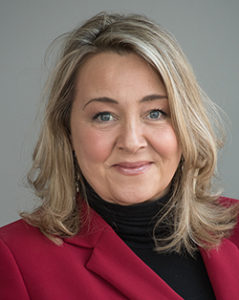Mindfulness practices like meditation, reflective writing, and other de-stressors are becoming more and more a part of campus life at Clark University.

“I see a real thirst in students for moments and spaces in which to be more present and aware,” says Jessica Bane Robert, assistant director of the Writing Center and a LEEP Center adviser, who teaches a half-semester course called “Mindful Choices.” “These practices have so many benefits for students: stress reduction, better mental and physical health, greater focus and self-control, greater self-knowledge and awareness, greater compassion for self and others, and the list goes on.”
Bane Robert helped create “Mindful Choices” four years ago with Sarah Buie, who oversaw the initiative as director of the Higgins School of Humanities before retiring in 2016, and Toby Sisson, associate professor of studio art. A Clark psychology alumna, Ellen Castellana ’73, is sponsoring the course for 2017-18.
“The course guides students’ reflection on where they have been, where they are, and where they are going through mindfulness and reflective writing practices, dialogue, and art-based activities,” Bane Robert says. “In this age of mass distraction, we can always do more to help ourselves and others bring mindfulness into our daily lives.”
Students have enjoyed the course so much that they launched a club to continue practicing what they had learned. In addition, James Córdova, professor and chair of the Psychology Department, and Justin Laplante, a doctoral student who works with Córdova, are holding free meditation sessions three times a week for Clark students.
Bane Robert’s teaching assistant for “Mindful Choices” this spring is Emmye Vernet ’19, who has contributed much energy to Clark community’s focus on mindfulness.
For her LEEP project last summer, the junior from Mystic, Conn., made it her mission to discover the intersection between mindfulness and social justice. She lived and worked for two months at Shambhala Mountain Center in Red Feather Lakes, Colorado, deepening her personal meditation practice and interviewing meditation teachers and practitioners committed to social change activism.
“I have learned that compassion is really the root of a mindfulness practice and social justice work,” Vernet says. “Caring for others is the basis of trying to change the world.”
Back on campus this year, she is sharing what she has learned. With other students, Vernet started a meditation group oriented around exploring meditation in relation to social activism.
“I’m excited to see where that group naturally flows,” Vernet says. “So far it’s been great to get together with other people to build a powerful community based around meditation, justice, and compassionate dialogue.”
Vernet’s student-designed major in social and environmental justice – which combines classes in international development and social change, geography, education, peace studies, political science, and sociology – has allowed her to study mindfulness practices and social activism.
“My major gives me the freedom to explore the things I am most passionate about, and this freedom has inspired me to do more self-created projects,” she says. “I am excited to see how this mindfulness project carries over into the rest of my life.”


